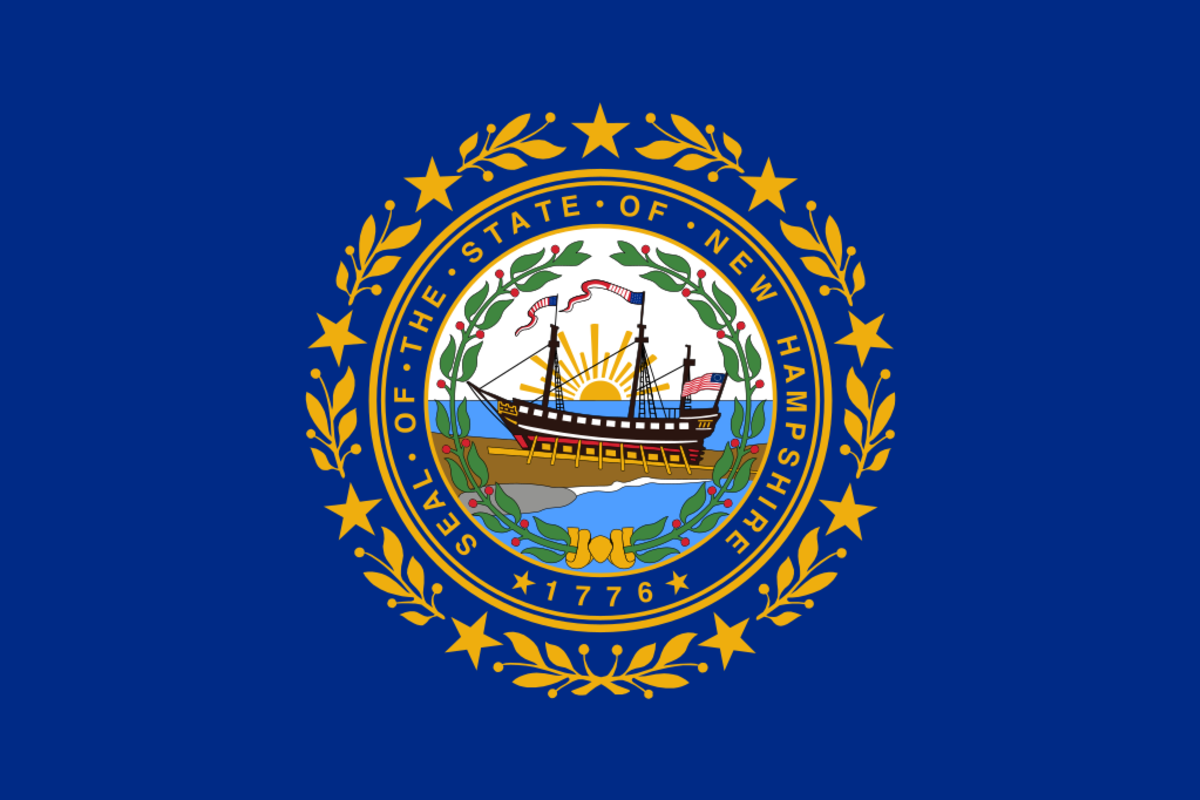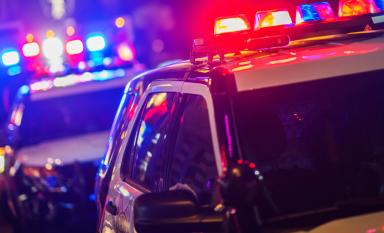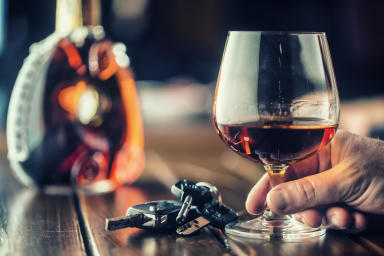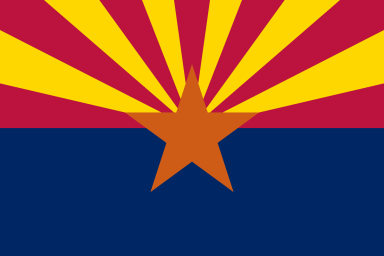New Hampshire DWI Laws

The residents of New Hampshire prefer to use automobiles for their daily commute. A 2021 Bureau of Transportation Statistics study shows that at least 69% of commuters drove alone to work. An additional 6.9% of employees carpooled to their workplace.
The state’s preference for motor vehicles is not without its consequences. According to the National Highway Traffic Safety Administration, 45 fatalities involving drivers with a blood alcohol concentration or BAC level of 0.08% were recorded in 2021. This number represents a 21.6% increase from 2020.
New Hampshire implements multiple programs to decrease DWI accidents throughout the state. One of these involves having sobriety checkpoints. These are performed in areas where impaired driving remains an issue. Another way that the state aims to curb impaired driving is through ignition interlock laws. Unlike some states, New Hampshire applies these laws to all DWI offenders.
Individuals who have figured in an accident involving an intoxicated driver may feel overwhelmed by the next steps they need to take. This article guides them on when to file claims and how much compensation can be obtained from liable parties. In addition, it provides an overview of the state’s social host and dram shop laws. Those charged with DWI can also use this article to determine the potential penalties they need to deal with.
General DWI Laws in New Hampshire
The Granite State makes it unlawful for a person to operate a vehicle while under the influence of various intoxicants. Besides alcohol, these include controlled substances and prescription and over-the-counter drugs. New Hampshire also does not allow intoxicated individuals to attempt to drive their vehicles. Manipulating vehicle controls, turning on the engine, or placing the car key inside the ignition switch are possible signs of an attempt. Additionally, physical control of the vehicle can be grounds for a DWI conviction.
However, state law specifies that a driver resting, sleeping, or sheltering in place while not seated behind the wheel does not mean they are in control.
Aside from individuals who operate motor vehicles, those who drive off-road highway vehicles, or OHRVs, while intoxicated face DWI penalties. Examples of OHRVs are ATVs, trail bikes, and UTVs. Notably, snowmobiles are not OHRVs.
New Hampshire law enforcement uses two tests to assess whether a suspected driver is intoxicated. The first type includes field sobriety tests. These generally consist of the three standard procedures: the one-leg stand, the walk-and-turn, and the horizontal gaze nystagmus test.
The second type refers to chemical procedures that use a suspect’s urine, breath, or blood samples. Warrants are typically required before the withdrawal of blood. However, although law enforcement requests blood tests, they cannot obtain the samples themselves. They must direct qualified individuals like licensed physicians, medical technicians, or phlebotomists to perform the procedure.
These chemical tests are done to determine the BAC level that the suspect possesses. A 0.08% BAC, by itself or “per se,” leads to DWI penalties. Meanwhile, commercial drivers with a BAC of 0.04% violate the state’s impaired driving laws. Incidentally, New Hampshire does not consider a 0.03% BAC as evidence of intoxication on first appearance or “prima facie”. If the individual has a BAC between 0.03% and 0.08%, that is not treated as conclusive proof that they are drunk. But it will be used, in addition to other evidence, to decide whether they committed DWI.
Aggravated DWI
One commits aggravated DWI in New Hampshire if they drive at least 30 mph over the prima facie speed limit. These limits differ by location. For instance, in business districts, drivers must not exceed 30 mph. On interstate highways, meanwhile, the speed threshold is 65 mph.
The state also considers intoxicated individuals driving with a passenger under 16 or those attempting to elude pursuing police as committing aggravated DWI. Other situations that lead to higher penalties than a standard DWI include driving with a 0.16% BAC and causing severe injuries to others.
Applicability to Cyclists
Bicycles are considered vehicles in New Hampshire. Hence, cyclists possess the same duties and rights as other motorists on the road. One of the ways bicycle users are similar to those who operate vehicles is through DWI penalties. E-bike users should know that they can commit DWI as well, as their mode of transportation is regulated similarly to traditional bicycles.
Underage DWI Laws in New Hampshire
Underage DWI laws are aimed at drivers under 21 years old — the legal drinking age — who drive vehicles while under the influence of alcohol and drugs. These regulations are in place to curb dangerous behavior. In fact, 4.6% of high schoolers in New Hampshire reported drinking before driving within the last 30 days, according to a 2021 survey.
New Hampshire's regulations to decrease the incidence of drunk driving include zero-tolerance laws. Individuals under 21 face DWI penalties if their BAC level is 0.02% or more. Additionally, the state bans alcohol possession and consumption among those under the legal drinking age. The few exceptions concerning possession involve those working in licensed establishments that serve alcohol. State law also allows minors to transport alcohol within their vehicles, as long as legal-age family members accompany them. These may include legal guardians, siblings, spouses, or stepparents.
DWI-Adjacent Laws in New Hampshire
Open Container Laws
No driver or passenger in New Hampshire may carry open containers of alcoholic beverages in the passenger section of their vehicles. Such beverages must be stored either in the vehicle’s trunk or in an area least accessible to the driver.
The state’s open container laws do not apply to hired vehicles like taxis, chartered buses, or limousines. Alcohol must nevertheless remain absent within the driver’s area.
Penalties for violating these laws include a $150 fine and a 60-day license suspension for first-time offenders. Subsequent offenses can increase the suspension period to one year.
Unlawful Possession of Marijuana in a Vehicle
As of 2023, New Hampshire is the only state in New England that has not fully legalized marijuana. Although the Granite State decriminalized possession of the drug in 2017, this only applies to amounts up to 0.75 ounces. But those caught with less than 0.75 ounces for the fourth time within three years of the first offense will be charged with a Class B misdemeanor. This charge carries a penalty in the form of a $1,200 fine.
Meanwhile, any individual possessing over 0.75 ounces of marijuana may be convicted of a misdemeanor. They face consequences such as fines up to $350 and imprisonment that lasts no more than a year.
Keep in mind that medical marijuana is legal in New Hampshire, with qualified patients being allowed to purchase a maximum of two ounces of the drug per 10 days. Patients may only obtain medical marijuana from an Alternative Treatment Center, or ATC.
Boating While Intoxicated
It is illegal to operate a boat while intoxicated by drugs or alcohol. State law defines boats as every type of watercraft used or that may be used as a mode of transportation on the water. These include sailboats, jet skis, and paddle crafts like kayaks.
Similar to individuals who drive cars, those who handle boats with a BAC level of 0.08% can be charged with DWI-related penalties. First-time offenders, for example, must deal with fines between $500 and $1,200, a one-year suspension of their boating privileges, and a license suspension that lasts three months to two years.
Penalties increase if a boat operator is caught violating BWI laws for the second or third time within 10 years. Fines can go up, for instance, to $2,000 for second and third-time offenders. Likewise, they may face up to one year of jail time and three to five years of license suspension.
Boat operators can also commit acts that are considered aggravated offenses. These include causing serious bodily injuries, boating drunk with a passenger under 16, or having a BAC of 0.16% or higher. Penalties for aggravated BWI involving severe injuries are inherently harsh. These include fines that range from $1,000 to $4,000 and prison time that lasts between 14 days and seven years.
What Are the Penalties for a DWI in New Hampshire?
New Hampshire drivers convicted of DUI face multiple consequences. A court in the state reviews an offender’s prior DWI history to determine their penalties. Those caught violating DWI laws for the second or subsequent time within 10 years face harsher penalties than first-time offenders.
The state also imposes a felony charge on people convicted of DWI for the fourth time within the past decade.
In addition, a DWI charge leads to six demerit points. Those who accumulate 12 points within one calendar year may have their licenses suspended for up to three months. For those who have collected 18 points in two years, the suspension period does not exceed six months.
Another penalty that New Hampshire enforces is mandatory participation in a state-approved Impaired Driver Care Management Program. This policy allows authorities to check whether an individual has a substance use disorder. Furthermore, the results of this program can help convicted drivers obtain the recovery, treatment, or education services they need.
Aggravated DWI Penalties
The harshness of these penalties depends on various circumstances. For example, intoxicated drivers who commit an accident that causes serious injuries will be charged with a Class B felony. This conviction carries a variety of penalties, ranging from a minimum 35-day jail sentence and at least $1,000 in fines to a license suspension lasting not less than 18 months.
In cases involving death, a driver may face up to $4,000 in fines, a maximum of 15 years of prison time, and an indefinite license suspension. The license can be reinstated after seven years, though.
Penalties for Minors
Besides license suspension and fines, convicted underage drivers may face other consequences. These may consist of community service and mandatory entry into a program that treats their substance disorder. The court can also order an underage offender to give up all the alcoholic beverages they own.
Implied Consent Penalties
Any person operating vehicles or boats within New Hampshire is seen as having consented to chemical tests. Individuals suspected of DWI who refuse testing must contend with various penalties. First-time offenders will have their license suspended for 180 days, while those who refuse for a second or third time face a two-year suspension.
Dram Shop and Social Host Laws in New Hampshire
New Hampshire specifies two ways that dram shops can be liable for DWI-related accidents. The first is through negligence. If a licensed business knows or should have known that the person it served alcohol to is a minor or intoxicated, its action can constitute negligent service. Additionally, selling alcohol to minors without requiring proof of age can be interpreted as negligence.
The second way businesses may be held at fault is through recklessness. If they sell drinks excessively and continuously to the point that their customers can die from alcohol poisoning, their action is considered reckless service. Other actions include helping visibly intoxicated patrons into their vehicles while knowing they intend to drive.
Notably, New Hampshire permits actions against dram shops if they actively encourage drivers to drink large amounts of alcohol.
Regarding social hosts, state laws hold them responsible for house parties involving individuals under 21 consuming alcohol or drugs. Hosts can face jail time and fines if they allow such gatherings. However, they can avoid prosecution if they prevent or attempt to stop the party. Social hosts may also notify law enforcement about the party promptly to reduce their liability risk.
Dram Shop and Social Host Liability Insurance
Since lawsuits are possible, dram shops must purchase insurance to manage lawsuit-related costs. Note that the Insurance Services Office gives a grade per state that reflects the liability situation alcohol vendors face in their area. The grade ranges from zero to 10, with 10 meaning vendors are strictly liable for alcohol-related damages. New Hampshire has a grade of seven. Consequently, businesses looking to buy liquor liability insurance in the Granite State must know that their rates may be higher than in other states.
Social hosts can also purchase insurance that covers alcohol-related accidents at events like Christmas parties and birthdays.
How Much Can Someone Sue for a Drunk Driving Injury in New Hampshire?
DWI victims in New Hampshire need to prove four elements to recover damages from liable parties. These are:
Duty: Plaintiffs must show that the defendant is expected to demonstrate their duty of care to others.
Breach: Plaintiffs must exhibit that the defendant fell short in meeting their duty of care.
Causation: Plaintiffs must then display how the defendant’s breach of their duty of care — by driving while intoxicated — caused injuries.
Damages: Finally, plaintiffs must show that they suffered damages because of the defendant’s actions that led to their injuries.
Individuals who utilize these elements effectively can receive full compensation for their injuries. In many cases, though, they contribute to the accident themselves. Fortunately for plaintiffs, New Hampshire allows them to obtain damages if their fault does not exceed 51% compared to the defendant. This means if the victim’s share of the responsibility for the accident is 50% or less, they can recover compensation. However, the final value of their award diminishes in proportion to their fault percentage.
Imagine that a drunk driver caused a crash that resulted in a person's injuries to illustrate this point. The damages from the accident are worth $100,000. The court found out during the trial that the plaintiff was texting while driving. This behavior is unfortunately typical for New Hampshire motorists, with half reporting they used their phone while behind the wheel in the past month. In light of the victim’s behavior, their share of the responsibility for the accident is determined to be 40%. This figure is used to decrease their damages by $40,000. Hence, the final value of their recoverable damages is $60,000.
Types of Damages
Compensatory damages refer to awards that allow plaintiffs to cover economic and non-economic losses. Economic losses, as the name implies, are objective. These include medical expenses and lost wages. On the other hand, non-economic losses are subjective. These refer to emotional distress and loss of companionship.
Punitive damages, another type of award, are provided to plaintiffs by courts seeking to punish defendants for their conduct. However, note that New Hampshire generally does not allow the awarding of punitive damages in any action.
Caps on Damages
There are no caps on compensatory damages in the Granite State. Additionally, the limit on non-economic damages that plaintiffs receive was declared unconstitutional in 1991.
Damages from governmental entities are capped, though. Under state law, plaintiffs may only receive $475,000 per person and $3.75 million per accident or up to the liability limit of the insurance policy that the agency purchased, whichever is greater.
The Statute of Limitations in New Hampshire
New Hampshire provides three years for DWI accident victims to press claims against at-fault parties, with the given timeframe beginning from the accident date. Similarly, the three-year period applies in cases where the victim has died. The difference between the two is that in wrongful death cases, the timeline begins on the day of the victim’s death. Claims against governmental entities must also be filed within three years from the date of the injury or death.
There are situations where the three-year period does not apply. If the victim is a minor, they have two years after they reach 18 to press legal action against liable parties. Similarly, the two-year deadline is used for cases involving victims deemed to be mentally insane or incompetent.
Resources for Folks Injured by an Impaired Driver in New Hampshire
New Hampshire Department of Safety - Division of Motor Vehicles
The division oversees the licenses of vehicle and vessel owners throughout New Hampshire. It has experience helping residents with disabilities obtain special parking privileges by issuing placards or plates. The division also maintains a website that allows DWI accident victims to provide their insurance information or report that the vehicle owner involved in their crash is uninsured. Another service accessible to New Hampshire residents involves accident reports. Note that the request for a report may only be submitted through a completed form placed inside the drop box located in Concord. One may contact the division through a call at 603-227-4010 or an email to NH.DMVHelp@dos.nh.gov to determine the cost of a report.
Mothers Against Drunk Driving New Hampshire
The organization offers various services to assist New Hampshire residents hurt in impaired driving accidents. These services include victim impact panels, which refer to classes where DWI offenders recognize their destructive behavior through stories shared by accident survivors or their families. One can access the organization’s website to check whether they are eligible for an online panel. Other services provided to victims include victim impact statement preparation. Those who would like to seek the group’s assistance may reach out via its 24/7 hotline: 1-877-623-3435.
New Hampshire Department of Justice
The department provides legal representation on behalf of New Hampshire and leads law enforcement agencies throughout the state. It helps DWI accident victims recover from their mental or physical injuries through the Victims’ Compensation Program, which only covers a maximum of $40,000 in crime-related losses. These covered losses include relocation expenses, dental care bills, burial costs, and lost wages. Note that the program does not cover pain and suffering or property loss. New Hampshire residents may contact the department by calling 1-800-300-4500. One can also send an email to victimcomp@doj.nh.gov.
Expertise.com StaffAuthor
Step into the world of Expertise.com, your go-to hub for credible insights. We don't take accuracy lightly around here. Our squad of expert reviewers, each a maestro in their field, has given the green light to every single article you'll find. From rigorous fact-checking to meticulous evaluations of service providers, we've got it all covered. So feel free to dive in and explore. The information you'll uncover has been stamped with the seal of approval by our top-notch experts.




